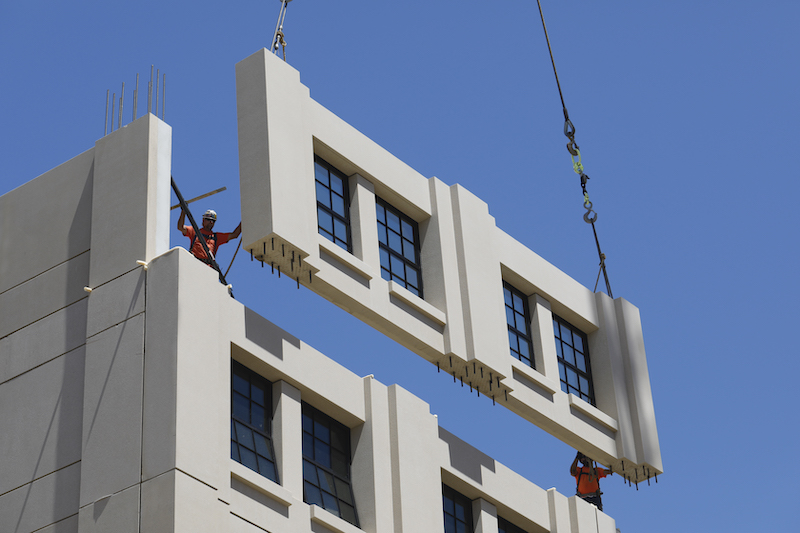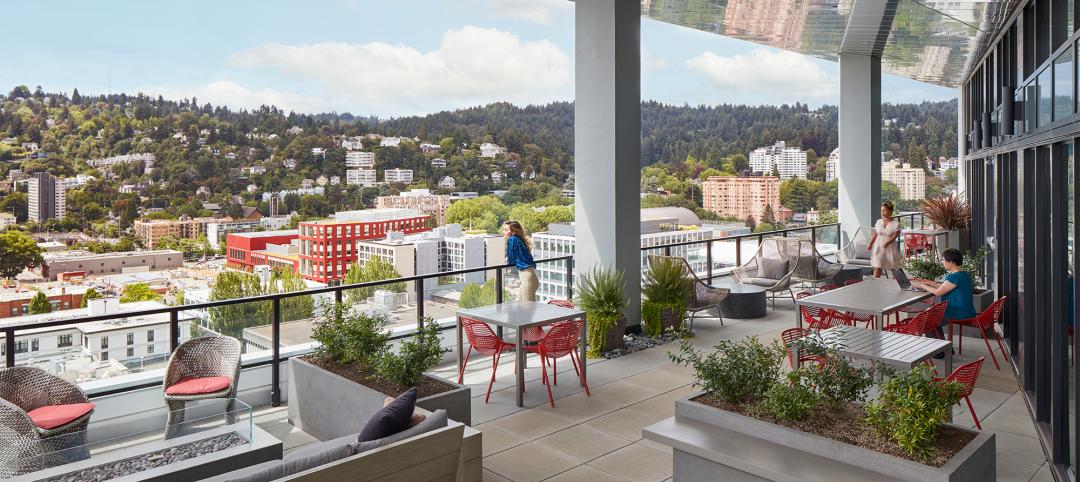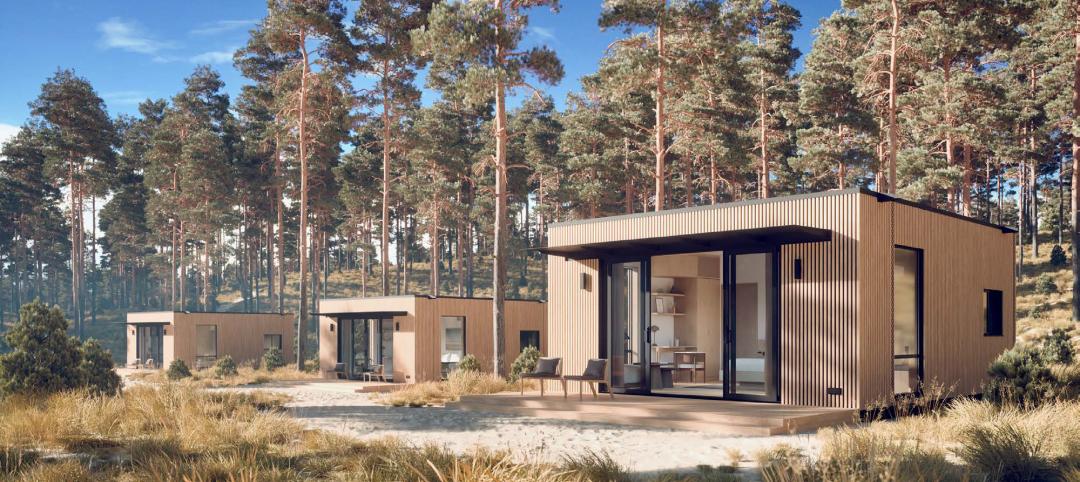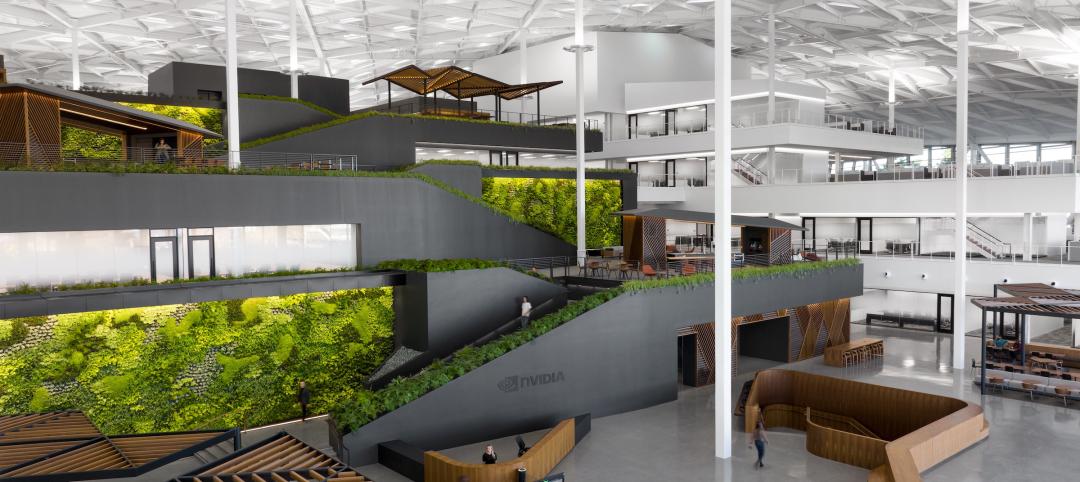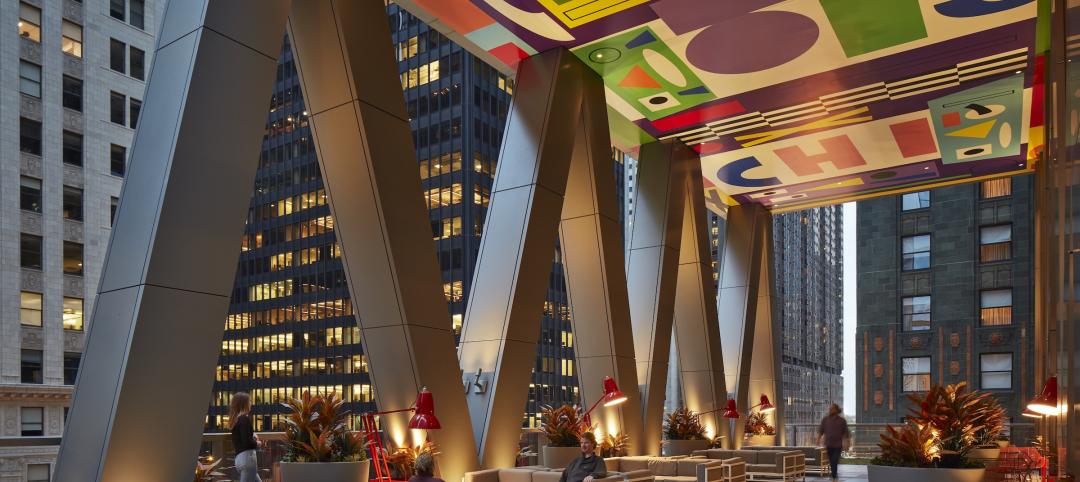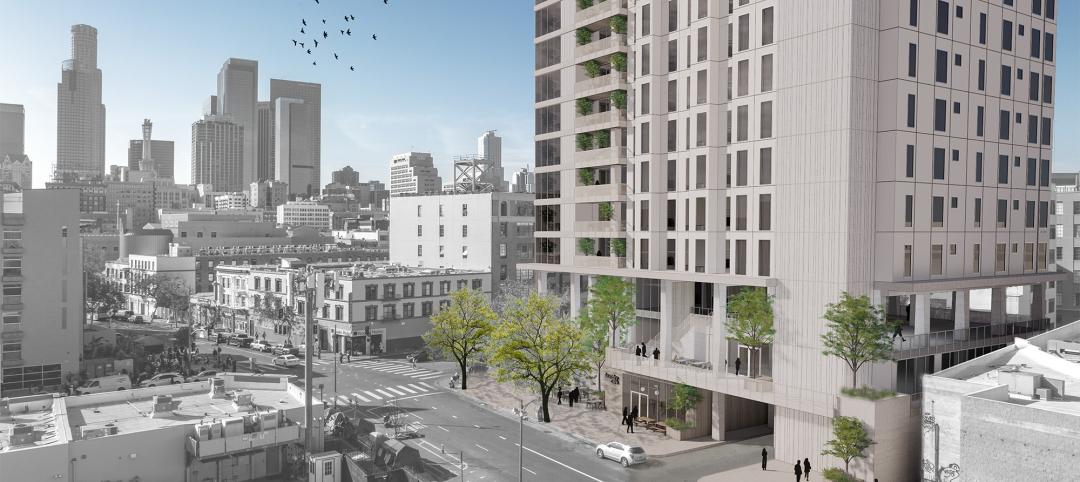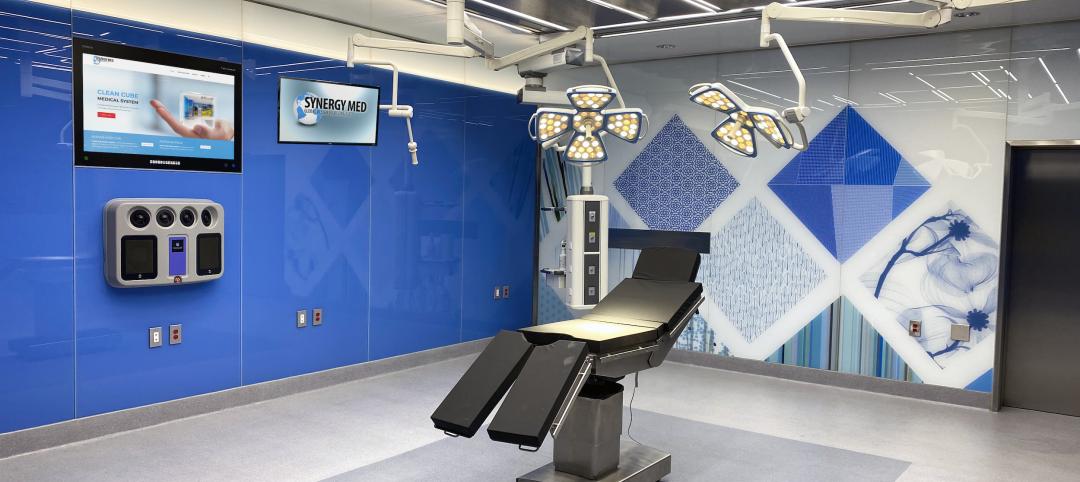Gensler, the global architecture firm, is currently working on nine citizenM-branded hotels across North America, including a 264-key hotel in the South Lake Union neighborhood of Seattle that, when it opens in May, will be that city’s first fully modular hotel.
Gensler is among a growing number of AEC firms that are incorporating prefabrication and modular construction into their project design. The hotel sector has been particularly receptive to modular construction, most notably Marriott International, which since 2015 has included prefab guestrooms and bathrooms in more than 50 of its projects.
The Building Team that worked on the citizenM project in Seattle stacked seven to eight modules per day, on average, and set all of the rooms in 89 days, reducing the project’s schedule by four months, and reducing construction waste by as much as 60%. (Mortenson is the GC on this hotel project.)
The rooms themselves are small; the width of a king-size bed and only 160 sf. But they are designed and built to luxury-brand standards with the latest control technology. The rooms will also include personal tablets that allow guests to track the hotel’s real-time sustainability performance.
ALSO SEE: Meet the masters of offsite construction
“Prefabrication has a lot of positive impacts: on construction speed, improved quality and construction tolerances, on people and processes,” observes Daniel Glaessl, Design Director for Gensler in its San Francisco Bay Area office.
He says that his office is using prefabrication “as often as possible.” But there are some challenges: manufacturing plants can be in remote locations, for one. (The modules for the citizenM hotel in Seattle were shipped to the Port of Seattle from a Europe-based supplier.) Glaessl adds that prefab requires more preplanning and longer lead times, and the components need to be designed so they can fit onto trucks for transport.
Clark Pacific sees growth in demand for prefabrication and modular construction solutions
As prefabrication and modular construction become more popular in the U.S., building teams and their clients have been turning to domestic supply partners. For example, Clark Pacific, a components provider that has operated out of West Sacramento, Calif., since 1963, is working with Gensler’s Seattle office through design assist on a separate citizenM hotel in San Francisco.
Clark Pacific is the single source for that building’s envelope, utilizing the supplier’s Infinite Panel, a standard frame and connection system that meets or exceeds Title 24, water, vapor, sound and fire code requirements. This project is entering the production phase in Clark Pacific’s Northern California plant that will prefabricate the hotel’s façade.
Façade manufacture is how Clark Pacific got started, says Mickey Ankheli, AIA, its Director of Architecture/Design-Build. But over the years it has expanded its product variety and delivery system.
Clark Pacific’s plant in Woodland, Calif., which sits on 120 acres, focuses on structural components and products for its glass division. The company’s 2-million-sf plant in Fontana, Calif., makes Infinite Panel and Architectural Precast products. And its factory in Adelanto, Calif., makes structural components.
Ankheli says his company is seeing a “lot of traction” in demand for prefabricated products from the multifamily and campus housing sectors. That demand is strengthening, he posits, because of the industry’s labor shortage. And prefab assembly is particularly well suited for tight urban settings.
But, he acknowledges, prefabricated delivery requires that design decisions “be locked in earlier, and architects need to understand these parameters.” His company now positions itself as a provider of turnkey design-build.
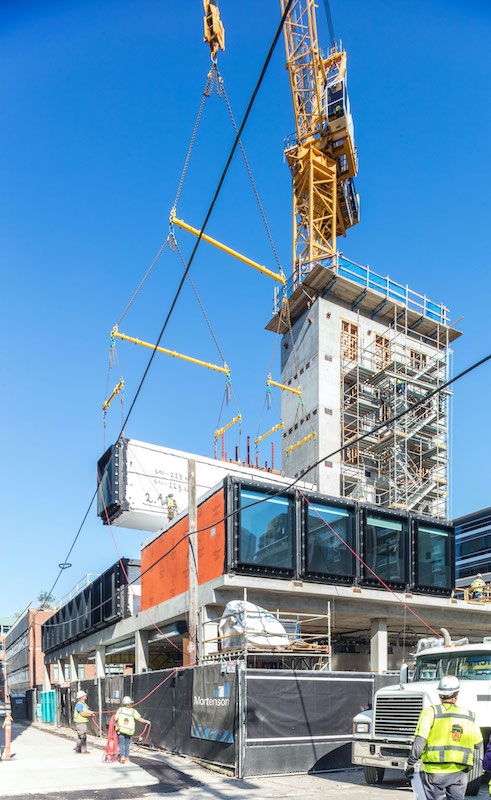
The construction of a citizenM hotel in Seattle used prefabricated modules that were placed seven to eight per day. Image: Gensler and Heywood Chen
“Prefab works best on projects that have a lot of iteration in their design,” says Glaessl. So design teams “need to be disciplined.”
That doesn’t mean there’s no flexibility in prefabrication or modular construction. Gensler and Clark Pacific are working on a parking structure for a technology client in the Bay Area. The structure, which will have a maximum capacity of 2,055 parking stalls, is being designed for adaptive reuse as office space, if market conditions warrant such a shift in use.
Ankheli recalls that, in midstream, the parking structure’s client wanted changes that included adding an athletic field to the project. While Clark Pacific had to retool a bit, Ankheli asserts that prefabrication actually made it easier to meet the client’s wishes.
The company, which sells into the west coast, including Arizona and Nevada, touts the resilience of its components, especially during seismic events. Clark Pacific sees its growth coming primarily from greater efficiency in serving its existing markets, says Ankheli.
Related Stories
Modular Building | Jan 19, 2024
Building with shipping containers not as eco-friendly as it seems
With millions of shipping containers lying empty at ports around the world, it may seem like repurposing them to construct buildings would be a clear environmental winner. The reality of building with shipping containers is complicated, though, and in many cases isn’t a net-positive for the environment, critics charge, according to a report by NPR's Chloe Veltman.
MFPRO+ Special Reports | Jan 4, 2024
Top 10 trends in multifamily rental housing
Demographic and economic shifts, along with work and lifestyle changes, have made apartment living preferable for a wider range of buyers and renters. These top 10 trends in multifamily housing come from BD+C's 2023 Multifamily Annual Report.
Data Centers | Nov 22, 2023
How is artificial intelligence impacting data center design?
As AI is reshaping how we interact with machines and the world around us, the design of data centers needs to adapt to this fast-changing landscape. So, Page pairs expert thinking with high-performing solutions to meet the needs of rapidly advancing technologies.
Modular Building | Oct 11, 2023
Development startup brings modular solution to hospitality industry
The company's approach extends to various types of accommodations, from landscape hotels and cozy bed and breakfasts to compact micro hotels and food and wine-themed properties.
Giants 400 | Aug 22, 2023
2023 Giants 400 Report: Ranking the nation's largest architecture, engineering, and construction firms
A record 552 AEC firms submitted data for BD+C's 2023 Giants 400 Report. The final report includes 137 rankings across 25 building sectors and specialty categories.
Giants 400 | Aug 22, 2023
Top 175 Architecture Firms for 2023
Gensler, HKS, Perkins&Will, Corgan, and Perkins Eastman top the rankings of the nation's largest architecture firms for nonresidential building and multifamily housing work, as reported in Building Design+Construction's 2023 Giants 400 Report.
Affordable Housing | Jul 27, 2023
Repeatable, supportive housing for the unhoused
KTGY’s R+D concept, The Essential, rethinks supportive housing to support the individual and community with a standardized and easily repeatable design.
Healthcare Facilities | Jul 19, 2023
World’s first prefab operating room with fully automated disinfection technology opens in New York
The first prefabricated operating room in the world with fully automated disinfection technology opened recently at the University of Rochester Medicine Orthopedics Surgery Center in Henrietta, N.Y. The facility, developed in a former Sears store, features a system designed by Synergy Med, called Clean Cube, that had never been applied to an operating space before. The components of the Clean Cube operating room were custom premanufactured and then shipped to the site to be assembled.
Affordable Housing | Jul 12, 2023
Navigating homelessness with modular building solutions
San Francisco-based architect Chuck Bloszies, FAIA, SE, LEED AP, discusses his firm's designs for Navigation Centers, temporary housing for the homeless in northern California.
Modular Building | Jul 6, 2023
Lennar, Mastry Ventures make multi-million dollar investment in net-zero prefab homes
Mastry Ventures and LENx, the venture arm of homebuilder Lennar, have co-invested in Vessel Technologies’ next-generation housing product.


